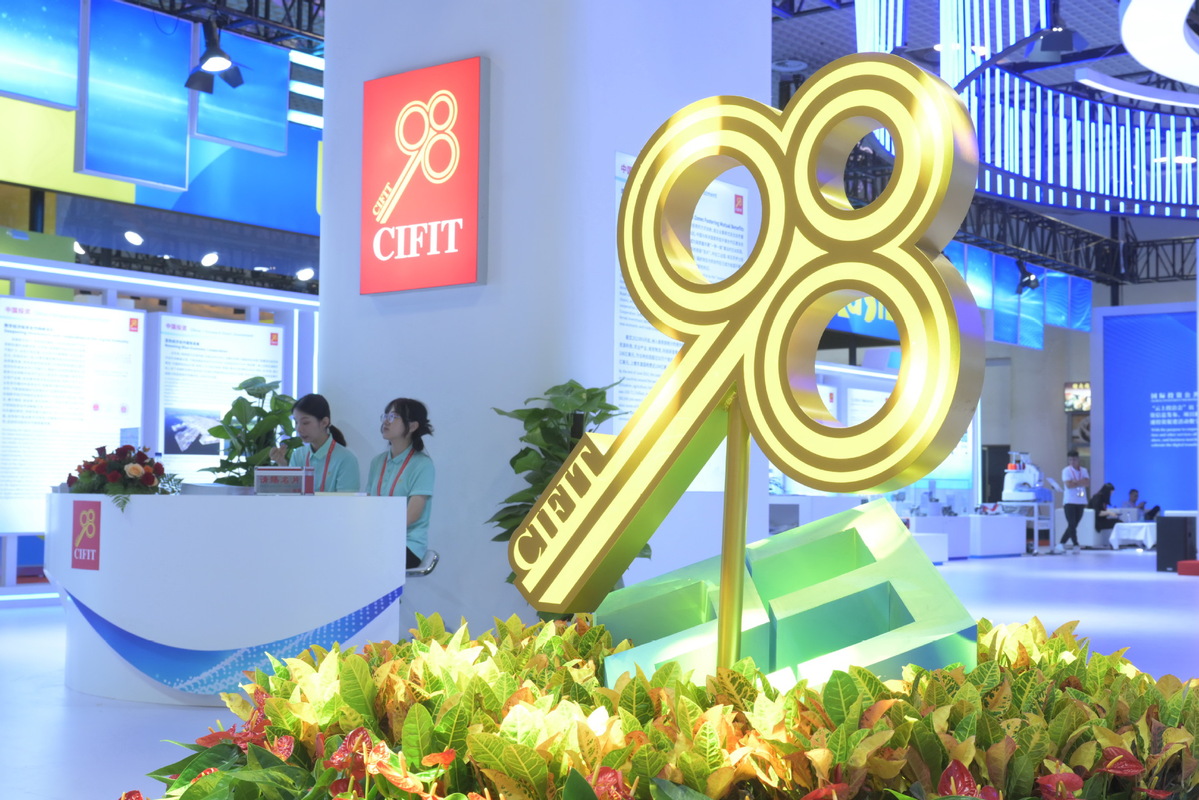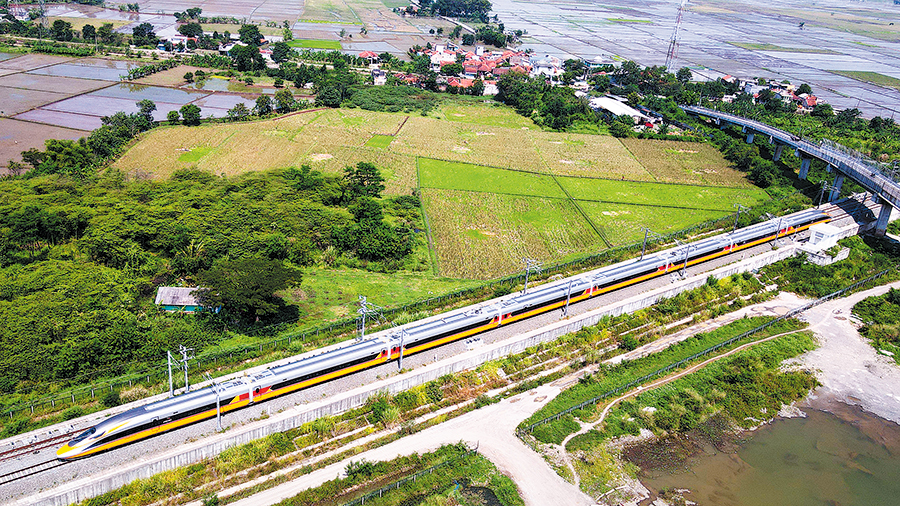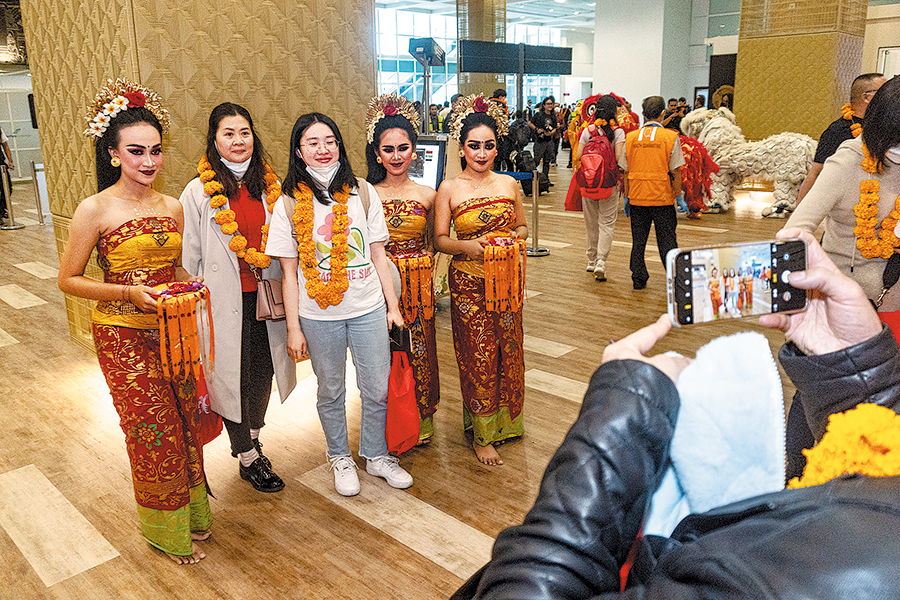


Facilitating trade and investment is a major task in building the Belt and Road.
China has signed bilateral investment agreements with 135 countries and regions.
The World Bank has estimated that by 2030, BRI-related investments could lift 7.6 million out of extreme poverty and 32 million out of moderate poverty.

Given uncertainties over global economic recovery, boosting investment confidence and promoting opening-up and cooperation have become more important, officials and business leaders said at an ongoing investment fair in Xiamen, Fujian province.
They made the remarks at the opening ceremony of the 23rd China International Fair for Investment and Trade, which opened on Friday and will conclude on Monday. This year, companies from 102 countries and regions are participating in the fair, with Serbia, Brazil and Qatar invited as guests of honor.
Wang Yong, vice-chairman of the 14th Chinese People's Political Consultative Conference National Committee, said in his opening address that the fair has become an important platform for promoting international cooperation and mutually beneficial development, and the event has made positive contributions to building an open world economy.
Foreign companies have continued a bullish outlook of China's growth prospects and the overall trend of expanding their investment in China remains unchanged, Wang said.
In the first six months, China's actual use of foreign capital remained stable. Some 24,000 foreign-invested enterprises were newly established in the country, up 35.7 percent year-on-year, according to the Ministry of Commerce.
At the opening ceremony, Chen Chunjiang, assistant minister of commerce, said the fair this year fully showcased China's firm determination to promote high-level opening-up to the world and the willingness to promote international exchange and cooperation.
"The Ministry of Commerce will guide the stable and orderly development of foreign investment, help improve the quality and level of foreign investment and cooperation and continue to promote the high-quality development of economies involved in the Belt and Road Initiative," Chen said.
United States agribusiness giant Archer-Daniels-Midland Company, or ADM, said it has been actively seeking opportunities to expand its operations in China, an important market and investment destination for the company. The investment fair serves as a good platform for the company to exchange ideas with peers and seek potential cooperation.
The agricultural sectors of China and the United States are highly complementary, and the two countries stand as important trading partners for each other.
"China and the United States boast significant potential and a foundation for further cooperation in low-carbon and renewable agriculture. We hope to play a role in promoting those areas," said Xiong Haochen, vice-president of government relations in the Asia-Pacific region of ADM.
Meanwhile, Bernard Dewit, chairman of the Belgian-Chinese Chamber of Commerce, delivered a speech via video link at a forum of the investment fair. The economic ties between Belgium and China have been strong for many decades, and the two countries have been strong trading partners for years, he said.
"There are a lot of opportunities for Belgian companies in a variety of sectors in China, such as the clean technology, food health and pharmaceutical industries, among others," Dewit said.
Moreover, the booming e-commerce sector and huge Chinese consumer market consisting of a population of more than 1.4 billion will continue to produce new business opportunities for Belgium in the future, he added.
Editor's note: This year marks the 10th anniversary of the launch of the Belt and Road Initiative. A decade of practice has demonstrated that it's a broad and prosperous way for China and the world to share opportunities and seek common development. In a more than 10-part series, China Daily finds out how the road of peace, prosperity, openness, green development, innovation and civilization will contribute more to the shared future of mankind.

Initiative boosts Chinese investment in Indonesia, becoming its largest trade partner
For Indonesian businessman Suwito, the Belt and Road Initiative has taken China-Indonesia relations "to the next level". Ten years after China put forward a global infrastructure and development program, Suwito noted the BRI has boosted Chinese investments and expanded trade with Southeast Asia's biggest economy.
"More Chinese companies have been investing in Indonesia (since the BRI started). Chinese companies have also opened offices in Indonesia, and now China is the number one (source of investments). China is now the largest trading partner of Indonesia," he said.
In 2022, China emerged as the second biggest source of foreign direct investments, or FDI, for Indonesia, with FDI inflows at8.2 billion.
Suwito, deputy chairman for the Hong Kong and Macao Committee of the Indonesian Chamber of Commerce and Industry, can personally attest to how the BRI has boosted Indonesian industries. Suwito's logistics company has enjoyed brisk business since the Indonesia Morowali Industrial Park, or IMIP, opened in 2015 in the Central Sulawesi Province.
The IMIP, a joint venture between Shanghai Decent Investment and Indonesia's Bintang Delapan Group, is home to nickel-related industries in Morowali, an area rich in nickel deposits. Suwito said his company's trucks and barges have been leased to transport coal and nickel in the IMIP.
Suwito said that IMIP is helping Indonesia, one of the world's biggest nickel producers, to export more high-value products such as processed nickel.
The IMIP is perhaps among the most high-profile BRI projects in Indonesia. Experts and industry players said the IMIP illustrates how the BRI has strengthened bilateral relations and supported Indonesia's development goals.
Shinta Widjaja Kamdani, chief executive officer of the Jakarta-based conglomerate Sintesa Group and chairwoman of the Indonesian Employers Association, APINDO, said the BRI projects are in line with Indonesian President Joko Widodo's focus on infrastructure development and economic growth. Kamdani also cited Widodo's thrust on more investments outside of Java, Indonesia's fourth-biggest island and home to more than half of the nation's population. The capital city of Jakarta is located in Java.

Reducing emissions
She said developing more infrastructure in other islands would improve people's quality of life, especially in rural areas. Kamdani said the BRI is aiding Indonesia's "economic decentralization", noting that several of BRI's big projects are in other areas of the archipelago.
Indeed, some of the most notable BRI projects in Indonesia are located outside of Java. The IMIP, for example, is located in Central Sulawesi while the Indonesia Weda Bay Industrial Park, or IWIP, is in the province of North Maluku. Like the IMIP, Weda Bay is an integrated nickel mining and processing zone.
Indonesia accounts for over 20 percent of the global nickel reserves and this huge resource has spurred the Indonesian government to promote the electric vehicle manufacturing industry. Nickel is one of the materials used for making batteries that power EVs.
The Batang Toru hydropower plant in North Sumatra aims to boost the country's renewable energy resources and reduce carbon emissions. The Probolinggo-Banyuwangi Toll Road in East Java, once complete, will be integrated with an existing ferry seaport that can ease traveling between the islands of Java and Bali.
Indonesia is perhaps one of the countries most closely associated with the BRI because it was in Jakarta, during a state visit in October 2013, that President Xi Jinping first proposed the idea of creating a 21st Century Maritime Silk Road. A month earlier, Xi proposed the idea of the Silk Road Economic Belt, which consists of road and rail construction, during his state visit to Kazakhstan. These two proposals would later evolve into what is now known as the Belt and Road Initiative.
Under the BRI, highways and railways, oil and gas pipelines, power networks, economic zones and industrial parks were built across Asia, Africa and Europe. These projects are expected to strengthen connectivity, boost regional cooperation and improve the people's standard of living. According to the Center for Strategic and International Studies, the BRI has served as an alternative source of infrastructure financing for Southeast Asian economies. The Jakarta-based think tank said the BRI also emerged at a time when the Association of Southeast Asian Nations, or ASEAN, was promoting the Masterplan on ASEAN Connectivity.

Maritime power
Widodo visited Beijing in 2015 where he said that Indonesia welcomes Chinese enterprises to take part in infrastructure development and establishment of special economic zones. Xi and Widodo agreed to enhance comprehensive strategic partnership. Xi said China's initiative of building the 21st Century Maritime Silk Road highly accords with the strategy of Indonesia in building itself as a maritime power.
President Widodo was also one of the leaders who participated in the first Belt and Road Forum for International Cooperation in Beijing. In 2019, during the Group of 20 Summit in Japan, Widodo met with Xi and said that Indonesia is ready to work with China to jointly build the BRI, deepen economic and trade relations and advance the construction of the Jakarta-Bandung high-speed rail project. The HSR has a top speed of 350 kilometers per hour and is expected to significantly cut the three-hour travel time between Jakarta and Bandung in West Java Province.
The BRI has played a crucial role in strengthening economic ties between China and Indonesia, according to Dedi Dinarto, lead Indonesia analyst at public policy advisory firm Global Counsel. He said Chinese foreign direct investment has grown significantly in the past few years, from800 million in 2014 to8 billion in 2022.
Dinarto said President Widodo, more known by his nickname "Jokowi", has used the financial opportunities offered by the BRI and the increased Chinese FDI to attain his administration's economic development goals.
"Using these substantial funds from China, Jokowi's administration has made significant progress in developing energy, industrial, and infrastructure sectors," Dinarto said. He said the BRI projects have not only benefited local companies involved in joint ventures but have also created employment opportunities for Indonesian workers.
Kamdani of Sintesa said the BRI is also facilitating technology transfer from China to Indonesia. She cited one of the BRI's biggest projects, the Jakarta-Bandung high-speed railway, saying that this is "an important milestone" for China and Indonesia.
The HSR is scheduled to have a trial run later this month. Kamdani said that Indonesia is the first country in the Southeast Asian region to have a bullet train and that it represents a key step in advancing Indonesia's infrastructure development.
She said that in PT Kereta Cepat Indonesia China, or KCIC, the joint venture that is managing the HSR, there are a total of 15,487 workers, of which 87 percent are Indonesians while the remaining are foreign workers. Most of the foreign workers are involved in the train's operation and development. "I think through their involvement and direct collaboration with experts, knowledge and technology transfer occur between foreign and local workers," she said.
Kamdani also hopes that more Indonesians will be aware of the BRI. She said that while most people know about China-Indonesia projects, they are not aware it's part of the BRI. She said the BRI needs to be promoted further.
Leonardus Jegho in Jakarta contributed to this story.
